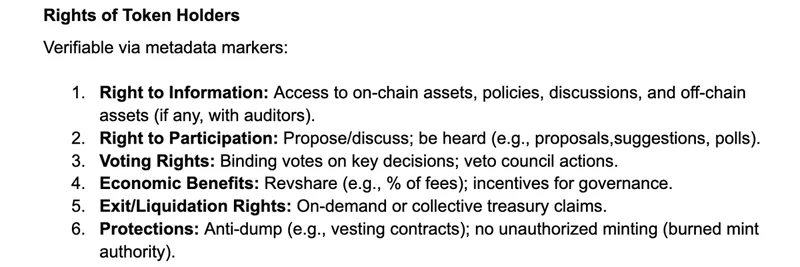In the fast-evolving world of blockchain and cryptocurrencies, token holder rights are becoming a hot topic. A recent thread on X by DeanTheMachine, Director at Realms DAOs, sheds light on this by analyzing Metaplex's $MPLX token against a proposed "Internet Capital Market Standard." This standard aims to protect investors and guide projects away from pure speculation toward more structured capital markets on the internet.
Dean draws inspiration from a Metaplex update on their October performance, which included $2 million in protocol revenue and significant buybacks of MPLX tokens. He breaks down six core rights that token holders should have, verifiable through metadata markers. Let's unpack these one by one, with simple explanations for anyone new to the space.
Right to Information: Full Transparency on Display
This right ensures holders can access all relevant data about the project's assets, policies, and discussions—both on-chain (directly on the blockchain) and off-chain (external audits or reports). For $MPLX, Dean gives it a resounding "YES, FULL" verdict. Tools like Realms DAOs and Ledger Top provide complete visibility. On Solana, where many tokens fall short, Metaplex stands out as a leader in transparency. Without platforms like Realms, achieving this level of openness is tough.
Right to Participation: Getting Your Voice Heard
Here, the focus is on allowing holders to propose ideas, discuss them, and be part of polls or suggestions. $MPLX scores "HIGH" because all holders can engage directly on Realms—voting, proposing, and commenting publicly. Dean even shared a screenshot of his own comment on a proposal, visible to everyone. If a token isn't using something like Realms, on-chain participation is basically non-existent. Metaplex excels here, making it easy for the community to chime in.
Voting Rights: Room for Improvement
Voting rights involve binding votes on key decisions and the ability to veto council actions. Dean rates $MPLX as "MID-LOW." While holders can vote on treasury management and policy changes through a council-community model, there's no veto power over council decisions. Compared to most tokens or even futarchies (governance systems using prediction markets), this is still ahead, but elevating it could mean giving the community veto rights and electing council members.
Economic Benefits: Sharing the Rewards
This covers revenue sharing, like a percentage of fees, and incentives for governance participation. $MPLX gets a "MID" score thanks to its strong buyback history, which benefits all holders by reducing supply and potentially increasing value. Most projects don't even offer this, so Metaplex's approach is a solid step forward in aligning economic incentives with token ownership.
Exit/Liquidation Rights: An Emerging Concept
The ability to exit or liquidate holdings on-demand or collectively from the treasury is rated "None" for $MPLX. This is a newer idea—only a few like MTN Capital have experimented with it recently. Dean suggests implementing quarterly or yearly burns where holders could exchange tokens for a share of the DAO's SOL holdings, adding a safety net for investors.
Protections: Safeguarding Against Risks
Protections include anti-dump measures like vesting contracts and burning mint authority to prevent unauthorized token creation. $MPLX scores "MID" since its mint authority is already burned—a common practice in early Solana tokens. To boost this, Dean proposes processes to prevent sudden releases of all tokens or treasury funds, perhaps via vesting. Interestingly, even ownership coins lack this, leaving room for multisig risks.
Dean wraps up by emphasizing the need for this standard. It could protect investors and provide clear guidelines for projects, shifting the industry from a "casino of speculation" to true internet capital markets. In the meme token space, where volatility reigns, adopting such standards could bring more legitimacy and attract serious blockchain practitioners.
For those diving into Solana or meme tokens, this thread is a must-read. It highlights how tools like Realms are pivotal for governance and why tokens like $MPLX are setting examples. If you're building or investing, consider how your projects stack up against these rights—it could make all the difference in building trust and value.


